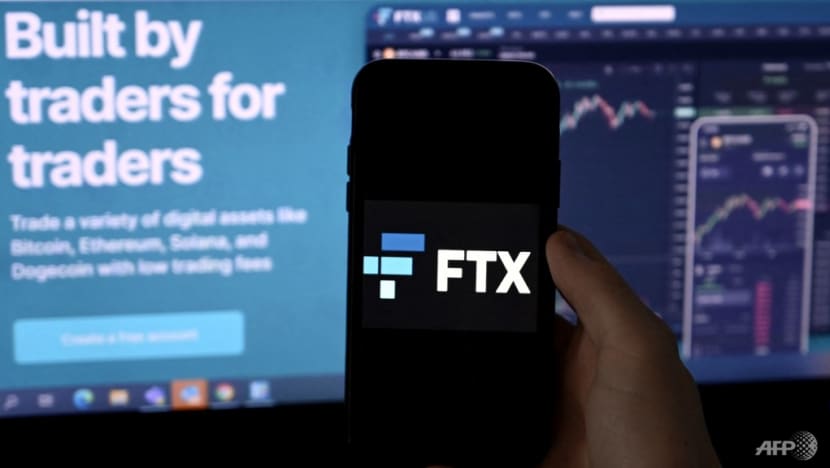FTX not on MAS' investor alert list as it was not actively soliciting Singapore users: MAS

A file photo showing a smart phone screen displaying the logo of crypto exchange platform FTX, with a screen showing the FTX website. (File photo: AFP/Olivier Douliery)
SINGAPORE: Cryptocurrency exchange FTX was not placed on the Monetary Authority of Singapore’s (MAS) investor alert list as it was not actively soliciting users in Singapore, the authority said on Monday (Nov 21).
In a statement addressing misconceptions and questions following FTX’s collapse, MAS said there was a “clear difference” between FTX and another cryptocurrency exchange Binance, which was ordered to stop providing payment services to Singapore residents in September.
Binance is listed on the investor alert list, which warns consumers that it is not regulated or licensed to provide any payment services in Singapore. The list also includes entities that may be wrongly perceived as being regulated by MAS.
Earlier this month, the authority said it had no cause to list FTX on the same basis as Binance.
It added on Monday that Binance was treated differently as it was actively soliciting users in Singapore, while FTX was not.
“Binance in fact went to the extent of offering listings in Singapore dollars and accepted Singapore-specific payment modes such as PayNow and PayLah,” it said.
MAS added that it received several complaints about Binance between January and August last year. Announcements were also made in several jurisdictions – including Malaysia, Japan and the United Kingdom – of unlicensed solicitation of customers by Binance during the same period.
"MAS placed Binance on the investor alert list because it had solicited Singapore users without a licence," said the authority.
On MAS' referral, the Commercial Affairs Department started investigating Binance for possible violation of the Payment Services Act.
In comparison, there was no reason to place FTX on the investor alert list as there was no evidence that it had contravened the Payment Services Act.
“Trades on FTX also could not be transacted in Singapore dollars,” it said. “But as in the case of thousands of other financial and crypto entities that operate overseas, Singapore users were able to access FTX services online," said MAS.
The authority required Binance to stop soliciting Singapore users, and the cryptocurrency company put in place various measures, including geoblocking Singapore IP addresses and removing its mobile application from Singapore app stores.
"These measures were intended to demonstrate beyond doubt that Binance had ceased soliciting and providing services to Singapore users," said MAS.
"Should Binance decide now to dismantle some of these restrictions, it has to continue to comply with the prohibition against soliciting Singapore users without a licence."
MAS also addressed if it should "exhaustively list" on the investor alert list and provide information on all offshore crypto exchanges in the world.
It said that there are hundreds of such exchanges and thousands of other entities offshore that accept investments in non-crypto assets, and that it would not be possible to list all of them. MAS added that no regulator in the world has done so.
"The purpose of the IAL is to warn the public of entities that may be wrongly perceived as being MAS-regulated, especially those which solicit Singapore customers for financial business without the requisite MAS licence," the authority said.
"It does not mean that the thousands of other entities operating offshore, which are not listed on the IAL, are safe to deal with."
“NOT POSSIBLE” TO PROTECT USERS WHO DEALT WITH FTX
In its statement, MAS also clarified that it was not possible to protect users in Singapore who dealt with FTX, such as ringfencing assets or ensuring that FTX backed its assets with reserves.
"MAS cannot do this as FTX is not licensed by MAS and operates offshore. MAS has consistently warned about the dangers of dealing with unregulated entities," said the authority.
"A further misconception is that if Singapore investors’ assets in FTX had been parked in Quoine, an FTX local subsidiary, they would have been protected. This is not so. Quoine, like other overseas subsidiaries of FTX, has been included in the US bankruptcy proceedings and has halted withdrawals."
FTX started bankruptcy proceedings in the United States on Nov 11, with founder and chief executive officer Sam Bankman-Fried resigning his post.
It said on Sunday that it owes its 50 biggest creditors nearly US$3.1 billion (S$4.28 billion), with about 1 million customers and investors left in a lurch.
“MAS has consistently warned about the dangers of dealing with unregulated entities,” it said.
“The most important lesson from the FTX debacle is that dealing in any cryptocurrency, on any platform, is hazardous," it added.
Noting that crypto exchanges “can and do fail”, MAS said that even if a crypto exchange is licensed in Singapore, it would currently only be regulated to address money-laundering risks, not to protect investors.
“This is similar to the approach currently taken in most jurisdictions,” it said, adding that it recently published a consultation paper proposing basic investor protection measures for crypto players who are licensed to operate in Singapore.
“Further, even if a crypto exchange is well-managed, cryptocurrencies themselves are highly volatile and many of them have lost all value," said MAS.
It highlighted the “ongoing turmoil” in the crypto industry as a reminder of the huge risks of dealing in cryptocurrencies.
“As MAS has repeatedly stated, there is no protection for customers who deal in cryptocurrencies,” it said. “They can lose all their money.”

















